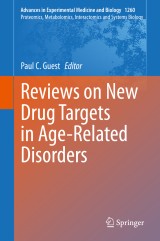Details

Reviews on New Drug Targets in Age-Related Disorders
Advances in Experimental Medicine and Biology, Band 1260
|
149,79 € |
|
| Verlag: | Springer |
| Format: | |
| Veröffentl.: | 17.04.2020 |
| ISBN/EAN: | 9783030426675 |
| Sprache: | englisch |
Dieses eBook enthält ein Wasserzeichen.
Beschreibungen
<p>Aging is an inevitable part of life and is becoming a worldwide social, economic and health problem. This is mainly due to the fact that the increasing proportion of individuals in the advanced age category have a higher probability of developing age-related disorders, such as type II diabetes mellitus, cardiovascular disorders, sarcopenia, and neurodegenerative conditions. New therapeutic approaches are still needed to decrease or slow the effects of such diseases. Advances in -omic technologies, such as genomics, transcriptomics, proteomics and metabolomics, have significantly advanced our understanding of disease in multiple medical areas, as the analysis of multiple molecular networks has simultaneously provided a more integrated view of disease pathways. It is hoped that emerging hits from these analyses might be prioritized for further screening as potential novel drug targets for increasing the human healthspan in line with the lifespan. In turn, this will lead to new therapeutic strategies as well as drug development projects by the pharmaceutical industry.</p>
<p>This book presents a series of reviews describing studies that have resulted in identification of new potential drug targets for age-related disorders. Much of this information has come from -omic comparisons of healthy and disease states or from testing the effects of new therapeutic approaches. Authored by experts from around the globe, each chapter is presented in the context of specific chronic diseases or therapeutic strategies. This book is designed for researchers in the areas of aging and chronic disease, as well as clinical scientists, physicians and stakeholders in major drug companies. </p>
<p>This book presents a series of reviews describing studies that have resulted in identification of new potential drug targets for age-related disorders. Much of this information has come from -omic comparisons of healthy and disease states or from testing the effects of new therapeutic approaches. Authored by experts from around the globe, each chapter is presented in the context of specific chronic diseases or therapeutic strategies. This book is designed for researchers in the areas of aging and chronic disease, as well as clinical scientists, physicians and stakeholders in major drug companies. </p>
<p></p><p>Ch-01 Targeting ROS-mediated Crosstalk between Autophagy and Apoptosis in Cancer.- Ch-02 Micronutrients that Affect Immunosenescence.- Ch-03 Bioactive Lipids in Age-Related Disorders.- Ch-04 Effect of Short Chain Fatty Acids on Age-Related Disorders.- Ch-05 The Effects of Parabiosis on Aging and Age-related Diseases.- Ch-06 Skeletal Muscle Aging Atrophy: Assessment and Exercise-Based Treatment.- Ch-07 Polyphenols as an Effective Therapeutic Intervention Against Cognitive Decline during Normal and Pathological Brain Aging.- Ch-08 Early Diagnosis and Targeted Treatment Strategy for Improved Therapeutic Outcomes in Alzheimer’s Disease.- Ch-09 Resetting the Aging Clock: Implications for Managing Age-Related Diseases.- Ch-10 The Challenge of Antidepressant Therapeutics in Alzheimer's Disease.- Ch-11 Anxiolytic Terpenoids and Aromatherapy for Anxiety and Depression.- Ch-12 The Role of Nutrition in Attenuating Age-Related Skeletal Muscle Atrophy.- Ch-13 The Use of Metformin to Increase the Human Healthspan</p><br><p></p>
<div><p><strong>Dr. Paul C. Guest, Ph.D, is a scientific researcher/writer with 37 years of experience in the fields of metabolic and neurological disorders. This includes experience in both academia and the pharmaceutical industry with the majority of time spent at the University of Cambridge and Merck Sharp & Dohme in the United Kingdom. He has also been affiliated with the University of Campinas in Sao Paulo Brazil since 2015, still focused on advancing the field of biomarkers for neurological disorders such as schizophrenia and age-related diseases such as diabetes, cancer, cardiovascular disorders, sarcopenia and Alzheimer’s disease.</strong><b> </b></p></div>
Aging is an inevitable part of life and is becoming a worldwide social, economic and health problem. This is mainly due to the fact that the increasing proportion of individuals in the advanced age category have a higher probability of developing age-related disorders, such as type II diabetes mellitus, cardiovascular disorders, sarcopenia, and neurodegenerative conditions. New therapeutic approaches are still needed to decrease or slow the effects of such diseases. Advances in -omic technologies, such as genomics, transcriptomics, proteomics and metabolomics, have significantly advanced our understanding of disease in multiple medical areas, as the analysis of multiple molecular networks has simultaneously provided a more integrated view of disease pathways. It is hoped that emerging hits from these analyses might be prioritized for further screening as potential novel drug targets for increasing the human healthspan in line with the lifespan. In turn, this will lead to new therapeutic strategies as well as drug development projects by the pharmaceutical industry.<p>This book presents a series of reviews describing studies that have resulted in identification of new potential drug targets for age-related disorders. Much of this information has come from -omic comparisons of healthy and disease states or from testing the effects of new therapeutic approaches. Authored by experts from around the globe, each chapter is presented in the context of specific chronic diseases or therapeutic strategies. This book is designed for researchers in the areas of aging and chronic disease, as well as clinical scientists, physicians and stakeholders in major drug companies. </p>
Provides an overview of studies on age-related disorders, which is an increasing problem worldwide Describes the research underway to slow or delay the progress of age-related diseases in humans Discusses both positive and negative findings
Diese Produkte könnten Sie auch interessieren:

Alzheimer's Disease: Cellular and Molecular Aspects of Amyloid beta

von: J. Robin Harris, Falk Fahrenholz

213,99 €















